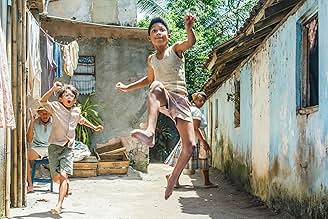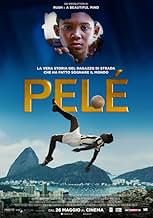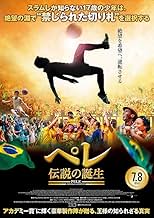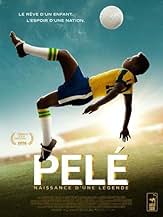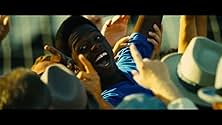IMDb रेटिंग
7.1/10
22 हज़ार
आपकी रेटिंग
17 साल की उम्र में साओ पाउलो की मलिन बस्तियों से पेले की उल्कापिंड वृद्धि ब्राजील को अपनी पहली विश्व कप जीत तक ले जाने के लिए इस जीवनी नाटक में दिखाई गई है.17 साल की उम्र में साओ पाउलो की मलिन बस्तियों से पेले की उल्कापिंड वृद्धि ब्राजील को अपनी पहली विश्व कप जीत तक ले जाने के लिए इस जीवनी नाटक में दिखाई गई है.17 साल की उम्र में साओ पाउलो की मलिन बस्तियों से पेले की उल्कापिंड वृद्धि ब्राजील को अपनी पहली विश्व कप जीत तक ले जाने के लिए इस जीवनी नाटक में दिखाई गई है.
- निर्देशक
- लेखक
- स्टार
Phil Miler
- Narrator
- (वॉइस)
Eric Bell Jr.
- Zoca
- (वॉइस)
फ़ीचर्ड समीक्षाएं
I grew up watching Football, i loved it and i still do, and of course i love my nation (Venezuela), but you just can't denied that you like Brasil for their style of playing, their amazing Joga Bonito, it's just masterful and beautiful that makes you think, can i do that?, there are 2 correct answers: you work all day, every day for a very long time to accomplish it, or just wait until another life and born with it like Pelé.
This is the guy that every Football player looks up to at least one time in their life, and of course for us Fottball lovers to know there is a movie about this legend it's like saying, there is a movie about Michael Jackson and you think: They better don't mess it up, because he is the best in the business and he deserves it. Trust me they have done it right in this film, the kid playing Pelé is really good with his ginga (freestyle of playing) and does honor to the man himself, he really capture the essence of what he means to every fan, player and Brazilian in the world. Makes me think, can he have Pelé's blood, yes he does, but not by family, but by nationality, they just have it in them.
The movie it's solid in the cinematography, it really shows the feeling of the country and their culture and the sport itself, the casting made me think some times about overacting, but i just forget about it and kept watching a great film. What i really loved is that Ginga is explained and gives real knowledge of what it means, it's now that they call it Joga Bonito, but they are the same: One amazing player. Donpt believe me? just take a good look yourself this movie and experience what Soccer (that's how Americans call it) it's really about, and you will have the most amazing teacher, Edson Arantes do Nascimento, or as is best known: Pelé.
This is the guy that every Football player looks up to at least one time in their life, and of course for us Fottball lovers to know there is a movie about this legend it's like saying, there is a movie about Michael Jackson and you think: They better don't mess it up, because he is the best in the business and he deserves it. Trust me they have done it right in this film, the kid playing Pelé is really good with his ginga (freestyle of playing) and does honor to the man himself, he really capture the essence of what he means to every fan, player and Brazilian in the world. Makes me think, can he have Pelé's blood, yes he does, but not by family, but by nationality, they just have it in them.
The movie it's solid in the cinematography, it really shows the feeling of the country and their culture and the sport itself, the casting made me think some times about overacting, but i just forget about it and kept watching a great film. What i really loved is that Ginga is explained and gives real knowledge of what it means, it's now that they call it Joga Bonito, but they are the same: One amazing player. Donpt believe me? just take a good look yourself this movie and experience what Soccer (that's how Americans call it) it's really about, and you will have the most amazing teacher, Edson Arantes do Nascimento, or as is best known: Pelé.
The best movie ever, because I feel very inspired by this amazing and one of a kind movie.
I want to state first that I do really like Pélé, he is one of the best athletes in history, not only in his athletic performance but also in his conduct outside the pitch.
His compelling personality is well displayed and I cannot speak with certainty about his background, but I suspect that while it was challenging it was perhaps not quite as bad as it is displayed at times.
My main problem with the movie is the display of the national teams aside from the brazilians. It was at this time and unlike the depiction of the movie well known that Brazil was a good team, perhaps not the favorites to win, but by no means a complete underdog. The favorites to win were West Germany, France and the Soviet Union. Sweden who is antagonisticly depicted was a nation with many players at the very end of their career and though the population was excited at their nations participation and that for the first time (for the swedes) professional players playing in clubs abroad would be permitted to play for the national team. So people were hopeful that with homefield advantage and the addition of a handful of worldclass professionals though perhaps past their prime(Niels Liedholm 36 at the time and Gunnar Gren 38) that maybe possibly Sweden could win.
So the primary factual error here is that Brazil was by no means colossal underdogs and the Swedes were not as massively favored as depicted and certainly not as arrogant and demeaning as they are shown. Though there is some truth in their strategy in the final game, the swedes did hope to try and score an early goal hoping the brazilians would be unable to recover.(According to Niels Liedholm).
I also find it unfortunate that while racism is horrible and was certainly present even amongst my own swedish ancestors. It is very unfortunate that this media never depicted some of the really inspiring moments of people in this tournament. Because in the end Pélé have stated that the swedish king at the time went down to meet the players on both sides and shook everybodys hand and chatted with them regardless of what they looked like. For many people just like the king football have no color and whilst Péle has had to deal with his fair share of racism he has seldom dwelt on the negative, but almost always uplifted the positive.
For my parents who vividly remember this tournament and who have always held Pélé in very high regard as both a footballer and a person. It was rather difficult to swallow the depiction of his opponents(our national team in particular) and that of the tournament as a whole which is perhaps one of the most memorable world cups in history with Pélé the 17-year old wunderkind and Just Fontaine who set a record of scoring goals that to this day stands.
His compelling personality is well displayed and I cannot speak with certainty about his background, but I suspect that while it was challenging it was perhaps not quite as bad as it is displayed at times.
My main problem with the movie is the display of the national teams aside from the brazilians. It was at this time and unlike the depiction of the movie well known that Brazil was a good team, perhaps not the favorites to win, but by no means a complete underdog. The favorites to win were West Germany, France and the Soviet Union. Sweden who is antagonisticly depicted was a nation with many players at the very end of their career and though the population was excited at their nations participation and that for the first time (for the swedes) professional players playing in clubs abroad would be permitted to play for the national team. So people were hopeful that with homefield advantage and the addition of a handful of worldclass professionals though perhaps past their prime(Niels Liedholm 36 at the time and Gunnar Gren 38) that maybe possibly Sweden could win.
So the primary factual error here is that Brazil was by no means colossal underdogs and the Swedes were not as massively favored as depicted and certainly not as arrogant and demeaning as they are shown. Though there is some truth in their strategy in the final game, the swedes did hope to try and score an early goal hoping the brazilians would be unable to recover.(According to Niels Liedholm).
I also find it unfortunate that while racism is horrible and was certainly present even amongst my own swedish ancestors. It is very unfortunate that this media never depicted some of the really inspiring moments of people in this tournament. Because in the end Pélé have stated that the swedish king at the time went down to meet the players on both sides and shook everybodys hand and chatted with them regardless of what they looked like. For many people just like the king football have no color and whilst Péle has had to deal with his fair share of racism he has seldom dwelt on the negative, but almost always uplifted the positive.
For my parents who vividly remember this tournament and who have always held Pélé in very high regard as both a footballer and a person. It was rather difficult to swallow the depiction of his opponents(our national team in particular) and that of the tournament as a whole which is perhaps one of the most memorable world cups in history with Pélé the 17-year old wunderkind and Just Fontaine who set a record of scoring goals that to this day stands.
Greetings again from the darkness. From rags to riches
a common expression that often leads to a paint-by-numbers movie. Co-directors Jeff Zimbalist and Michael Zimbalist are fortunate in that their "coming of age" subject is the globally famous Pele' – often considered the greatest soccer/futbol player of all-time.
Rather than revisit the career of the transcendent player who later dedicated his life to humanitarian causes, the film kicks off with a 17 year old Pele trotting out onto the pitch at the 1958 World Cup. It then flashes back 8 years to when 9 year old "Dico" was growing up in the slums of Sao Paulo. We get to see his relationship with his family his dad taught him to play, and his friends were loyal to him and encouraged him to pursue his dream.
There are some similarities to "The Sandlot" as we watch the joy these boys have in playing the sport whenever and wherever they can plus the origin of the somewhat derogatory and now immortal nickname. It seemed that Pele' was able to carry this love of the game throughout his career. We see boys huddled around a radio listening to the 1950 World Cup as Brazil's team was humiliated an event that played a role in Pele' returning pride to a bruised country.
Kevin de Paula plays Pele' as he works his way up through the age groups and national teams. Often the youngest and shortest player, the film depicts him as a shy kid often out of his element the polar opposite to the beaming superstar we so often saw later in his career. There is an explanation of the roots of the "Ginga" style and its ties to the Brazilian culture and martial arts.
For some reason, Vincent D'Onofrio is cast as Brazil's Coach Feola and we are forced to endure a tortuous accent that is basically inexcusable these days. There are also some exaggerations in the crowd scenes and shots of the press, though young de Paula underplays the lead. Colm Meaney plays George Raynor, the coach of Sweden in that infamous 1958 World Cup, and we do get a cute little cameo from Pele' himself.
The film does a nice job with the young man's childhood and progression towards superstar (the IOC named him the athlete of the century). He is presented as close to his family, and inherently quiet and calm. The match clips of Pele' that play over the closing credits are proof that a movie just can't capture the transcendence of his talent. Pele' is truly the reason it's "the beautiful game".
Rather than revisit the career of the transcendent player who later dedicated his life to humanitarian causes, the film kicks off with a 17 year old Pele trotting out onto the pitch at the 1958 World Cup. It then flashes back 8 years to when 9 year old "Dico" was growing up in the slums of Sao Paulo. We get to see his relationship with his family his dad taught him to play, and his friends were loyal to him and encouraged him to pursue his dream.
There are some similarities to "The Sandlot" as we watch the joy these boys have in playing the sport whenever and wherever they can plus the origin of the somewhat derogatory and now immortal nickname. It seemed that Pele' was able to carry this love of the game throughout his career. We see boys huddled around a radio listening to the 1950 World Cup as Brazil's team was humiliated an event that played a role in Pele' returning pride to a bruised country.
Kevin de Paula plays Pele' as he works his way up through the age groups and national teams. Often the youngest and shortest player, the film depicts him as a shy kid often out of his element the polar opposite to the beaming superstar we so often saw later in his career. There is an explanation of the roots of the "Ginga" style and its ties to the Brazilian culture and martial arts.
For some reason, Vincent D'Onofrio is cast as Brazil's Coach Feola and we are forced to endure a tortuous accent that is basically inexcusable these days. There are also some exaggerations in the crowd scenes and shots of the press, though young de Paula underplays the lead. Colm Meaney plays George Raynor, the coach of Sweden in that infamous 1958 World Cup, and we do get a cute little cameo from Pele' himself.
The film does a nice job with the young man's childhood and progression towards superstar (the IOC named him the athlete of the century). He is presented as close to his family, and inherently quiet and calm. The match clips of Pele' that play over the closing credits are proof that a movie just can't capture the transcendence of his talent. Pele' is truly the reason it's "the beautiful game".
Pelé: Birth of a Legend is an extraordinary movie, the tale of how Pelé became famous and won with Brazil their first world cup in the 1958 world cup in Sweden. This is probably the most successful movie that focuses on soccer. A true story of a boy with nothing who became the world's greatest soccer player. No famous actors in this film except for Vincent D'Onofrio. But the movie doesn't need famous actors to attract the attention of the viewers, it's beautiful story is what attracted me in the first place. Along with the music composed by A. R. Rahman That follows the emotion and scenes throughout the film. Pelé's legend is worth to be told and has a deep meaning to Brazil's history of soccer and hope of becoming the best. The movie is also a story of restoring honor and hope to a full nation. Only it is sad that today Brazil's soccer team can't be as great as it was back then. So this film brings a lot of nostalgia towards the past and a better hope for the future. I am hoping to see other movies about soccer like this one in the future, maybe a movie about Neymar or Messi.
क्या आपको पता है
- ट्रिवियाThe Old Guy in suit who's tea was dropped by the Brazilian team at the hotel before the Final of 1958 World cup was actually the real Pele as himself.
- गूफ़In the film, Pelè's mother is a servant in Josè Altafini "Mazzola's" home. In real life, both Pelè and Altafini were from modest families. They also lived in different towns.
- क्रेज़ी क्रेडिटThe end credits include the disclaimer that "The persons and events in this motion picture are fictitious. Any similarity to actual persons or events is unintentional." Which is of course ridiculous considering this is a biopic of Pelé loaded with real events (like the 1958 world cup).
- कनेक्शनFeatures 1958 FIFA World Cup (1958)
टॉप पसंद
रेटिंग देने के लिए साइन-इन करें और वैयक्तिकृत सुझावों के लिए वॉचलिस्ट करें
- How long is Pele: Birth of a Legend?Alexa द्वारा संचालित
विवरण
- रिलीज़ की तारीख़
- कंट्री ऑफ़ ओरिजिन
- आधिकारिक साइट
- भाषाएं
- इस रूप में भी जाना जाता है
- Pele: Birth of a Legend
- फ़िल्माने की जगहें
- उत्पादन कंपनियां
- IMDbPro पर और कंपनी क्रेडिट देखें
बॉक्स ऑफ़िस
- US और कनाडा में सकल
- $57,046
- US और कनाडा में पहले सप्ताह में कुल कमाई
- $7,226
- 15 मई 2016
- दुनिया भर में सकल
- $78,46,608
- चलने की अवधि1 घंटा 47 मिनट
- रंग
- पक्ष अनुपात
- 2.35 : 1
इस पेज में योगदान दें
किसी बदलाव का सुझाव दें या अनुपलब्ध कॉन्टेंट जोड़ें




